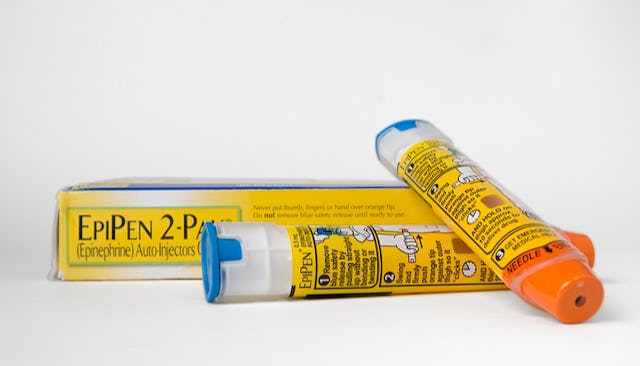Mylan Lowers Price Of EpiPen To $300, It Still Only Costs Them $30 To Make

Mylan pays only 20% of what consumers are charged for the pens
Following enormous backlash last summer, the pharmaceutical company Mylan has decreased the cost of its life-saving Epi-Pens from $600 a pair to $300 for a pair of generic pens. That’s a 50% drop, and that would be great, except that it only costs Mylan $30 to make each pen.
EpiPens provide life-saving emergency treatment for children with severe allergies. Parents of these children need about four pens in order to make sure their children always have access to the medication (one pen plus a back-up at both home and school), and the pens need to be replaced annually. at $600 a pair, some families were paying $1200 a year on medication they needed to make sure their children wouldn’t die from an anaphylactic reaction. Even with some of the better insurance plans, parents were still paying hundreds of dollars a year for it.
After being roasted alive by the press, Mylan has come up with a solution: they are making a generic version of the EpiPen for half the price of the brand-name version. This version will be available not long after the Auvi-Q epinephrine auto-injector returns to the market from Mylan competitor, Kaleo Pharmaceutical. The Auvi-Q was originally pulled because there were concerns that it was not delivering the right dose of epinephrine, but the product is now being made by a different company which promises to have corrected that issue.
Mylan is clearly hoping to build on the reputation of the EpiPen as the most dependable choice for parents while also responding to its critics. According to Time, “experts say could possibly even lead to even higher profits for Mylan because production and distribution of generics cut out some of the middlemen that make name-brand drugs cost more.”
“Hurray, we win again,” says Big Pharma, as they flit about on a field made of money while sipping drinks made of pureed money.
The problem is, as we learned not long after the original controversy came out, it costs Mylan $30 to make an EpiPen. For those of you who don’t math, if two pens cost Mylan $60, then they are paying 20% the cost of the generic and 10% the cost of the brand-name version.
Those are some pretty high returns when you’re talking about medication that saves children’s lives.
If this was Botox, we wouldn’t be having this conversation. As far as we’re concerned, you can charge whatever you want for a dose of botulism that people inject into their faces to paralyze their muscles so they’ll look younger because maybe then no one will know they’re 60 and also maybe they’ll never die. But epinephrine? Come on, now. Mylan CEO Heather Bresch says that it’s the “four to five hands” that touch the product in between when they make it and when it gets sold that are responsible for the high price of EpiPens, but many don’t buy that as a valid excuse for the enormous price increases over the past few years. Mylan has, after all, not only settled a lawsuit after deceiving Medicaid by claiming that the brand-name drug was a generic, but it also dodged taxes by using a “transparently self-serving” loophole called inversion.
This company has not exactly shown itself to be the most honest and trustworthy when it comes to money. Would you ask Mylan to watch your purse for a minute while you got a drink of water? I wouldn’t.
And when it comes to the new generic version, some say that the claim of a 50% saving is just as misleading. The fact is that Mylan will be charging the same outrageous price for their generics. The LA Times explained it this way: “[The 50% savings claim] increase[s] demand and provide[s] public-relations benefits, while concealing the true price of a product charged to commercial insurers and public healthcare programs such as Medicare and Medicaid.”
As Senator Bernie Sanders of the generic pens: “This isn’t a discount. It’s a PR move.”
This article was originally published on